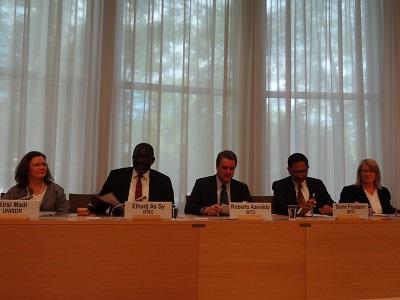
(From left) Trade and Disasters Symposium panel: UNISDR Director, Kirsi Madi, IFRC Secretary-General, Elhadj As Sy, WTO Director-General, Roberto Azevêdo, WTO Panel Moderator, Shishir Priyadarshi, and Ambassador Frances Lisson, Australia.
By Denis McClean
GENEVA, 26 April, 2018 - The World Trade Organization today called for greater dialogue on the impacts of the growing number of disasters on world trade and the role trade can play in building resilience to disasters.
It also announced that its Aid For Trade section will undertake a mapping exercise to capture the experience of disaster-affected members and release a report early next year.
Mr. Roberto Azevêdo, WTO Director-General, opening the “Natural Disasters and Trade Symposium”, said that the immediate catalyst for deciding to look at the issue was the Declaration made at the WTO’s 11th Ministerial Conference in December by Dominica and other Eastern Caribbean states on the catastrophic damage caused by last year’s Atlantic Hurricane Season.
The Symposium heard that Dominica lost over $1 billion as a result of category 5 Hurricane Maria, equivalent to over 242% of the small island developing State’s GDP and the overall poverty rate on the island has risen from 28.8% to 42.8%, according to Mr. Ricardo James, representative of the Organisation of Eastern Caribbean States (OECS).
Mr. Azevêdo also cited the example of Vanuatu whose graduation from least-developed country status had to be pushed back until 2020 because of Cyclone Pam.
WTO has acted in response to a number of disasters including trade preferences granted to Nepal in the wake of the 2015 earthquake and Pakistan following the 2010 floods.
Mr. Azevêdo said: “UNISDR says disaster risk reduction is everyone’s business and I absolutely agree with this sentiment and my hope is that this symposium will stimulate dialogue on these issues.”
He called for examination of disaster impacts through Trade Policy Reviews and other interactions. “Let’s look for ways that the trade community can respond to disasters, support recovery and promote resilience.”